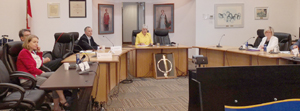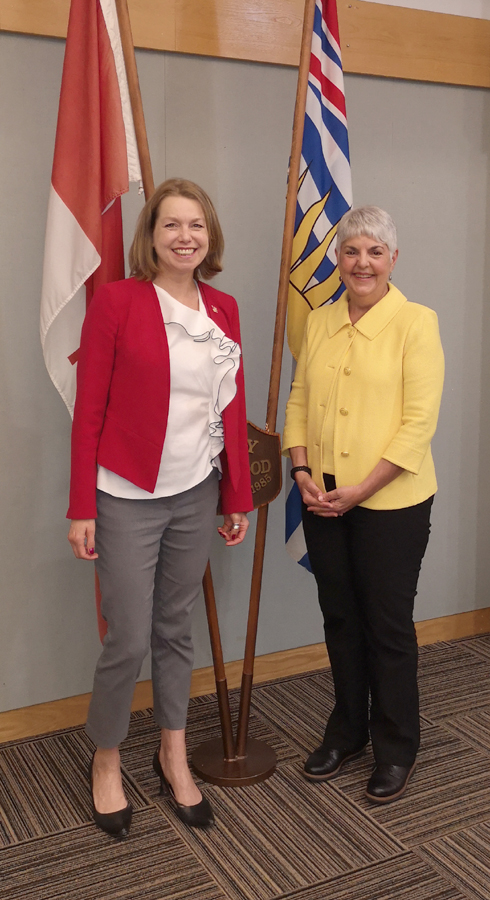
Tuesday, June 11, 2019 ~ WEST SHORE
by Mary P Brooke ~ West Shore Voice News
Presentations in person on Monday in Colwood were the stuff of the first day of 15 public consultation sessions being held around BC by the Select Standing Committee on Finance and Government Services during June 10 to 21.
Committee chair Bob D’Eith, MLA (Maple Ridge-Mission) thanked Finance Minister Carole James for coming to address the committee before presentations from the public began. Minister James talked about success with housing starts, not relying on one area of the economy as a way to weather the impact of outside factors, and BC’s triple-A credit rating.
Minister James said that public input is welcome online to identify the top three actions government can take with the 2020 provincial budget. “If you had one dollar, where would you direct it?” is the approach to listening to public input, said James. Options include increased services, increased taxes, and consideration of some things being closed off so that funds can be put toward something else.
Local MLA for Esquimalt-Metchosin, Mitzi Dean, welcomed the committee to her constituency area, noting that “Colwood is right in the middle” of her west shore constituency.

The session held in City of Colwood council chambers provided 10 minutes for each presenter to summarize their case (as provided to the committee ahead of time in writing) and to answer questions.
The committee heard from a representative of the Victoria Residential Builders Association about housing affordability. VRBA Executive Director Casey Edge said a a regional strategy to build the required high density housing is needed, instead of dealing with a “hodgepodge of (local) governments”. He pointed out that “government doesn’t control housing” as it is local government decisions on zoning, building permits and how the BC building code is interpreted as to how much housing ends up costing. “It should not be left to the discretion of small (local) councils,” Edge told the committee. “Housing affordability is not complicated,” said Edge, outlining factors that he says are complicating housing affordability: “low interest rates, low unemployment, and insufficient supply for Millennials”. Committee member Rich Coleman, MLA said the VRBA presentation was “very well done”.
The committee heard from a representative of the Victoria Sexual Assault Centre (VSAC) who pitched to the committee that with an ongoing financial contribution from the provincial budget to the standalone trauma clinic that there could be overall financial efficiencies in the cost to hospital emergency rooms and doctors, nurses and police. Victoria Sexual Assault Centre spokesperson Grace Lore told the committee that with trauma-informed care at the Victoria Sexual Assault Centre, the outcomes are seen as better for the victims (all services in one setting with more privacy) while achieving a saving of about $1,300 per trauma visitor, as a 3- to 4-hour hospital ER wait for police is reduced to about 1 hour at the clinic, and the on-site medical and forensic nursing services at the clinic allow for ER doctors and nurses to deal with other needs in their department. “This is an opportunity for BC to be a leader in providing better, more cost-effective, trauma-informed care” to victims of sexual assault, said Lore.
The committee heard from a representative of The Cridge Centre for the Family regarding a particular financial opportunity to support the care of women victims of sexual partner violence who have incurred brain injury. Cridge Centre Manager of Brain Injury Services, Geoff Sing, called it a “serious impairment” that isn’t normally articulated in domestic violence recovery. Brain injury in these women leads to depression, PTSD, mood swings, coping difficulty, memory loss and confusion — all of which make housing, parenting and employment more difficult. Funding to support this area of care would spin off a wide range of improvements that would ultimately help reduce the cost of social support services to the affected women, their families and communities.
Representatives of the Boating BC Association addressed the committee about the positive impact of boating to the tourism sector of the provincial economy. In particular, from Boating BC Association President Don Prittie and Executive Director Lisa Geddes there was a pitch for relieving the Provincial Sales Tax on boaters and small businesses in the boating service industry including manufacturers, maintenance, detailing and sellers who “service, sell to and take care of the recreational boating industry”. Committee Chair D’Eith wondered if this presentation should instead go to Treasury Board.
The Federation of Community Social Services of BC addressed the committee, starting with an acknowledgement of “the work this government has done” in providing universal child care, makes changes to the network of care of children who are in government care, and including child are approaches in their poverty reduction strategy. The suggestion was that Budget BC 2020 include more funding for programs and services for people who experience trauma, who are looking for or need a job, who support elderly parents. “The sector doesn’t have the capacity to do what needs to be done,” said the representative.
Representatives from Pearson College explained the important role of the International Baccalaureate school located in Metchosin. Pearson College President Desiree McGraw and Director of Advancement Carly Milloy explained how the private college falls between the cracks of the Ministry of Education and the Ministry of Advanced Education, Skills & Training; graduates do not get a Dogwood (Grade 12 BC Diploma). The course levels are Grade 11 and 12, plus the equivalent of first-year university; graduates can often get right into second-year university after graduating from Pearson. About 25% of their students are from around Canada, with 75% from locations around the world. About 90% of the students are there with some sort of financial assistance. “We are not a typical private school, we are not elites,” said McGraw to the committee. She said that Pearson College — founded in 1974 and receiving $7 million from government up to 2012 (but nothing after that), is the only educational institution “with no support from the BC Government”. Due to the international nature of the student population, many go on to become leaders in their communities around the world, or maintain a global perspective while acting locally. To explore options, Pearson College has had discussions with Education Minister Rob Fleming but has not yet had an opportunity to provide a campus tour to Advanced Education, Skills & Training Minister Melanie Mark.
Holding public input in June is earlier than last year, allowing time for Ministries to work with the input results starting in September 2019 toward the next budget coming in February 2020.
Members of the committee are:
- Bob D’Eith, MLA Maple Ridge-Mission (chair)
- Dan Ashton, MLA Penticton (deputy chair)
- Doug Clovechok, MLA Columbia River-Revelstoke
- Rich Coleman, MLA Langley East
- Mitzi Dean, MLA Esquimalt-Metchosin
- Ronna-Rae Leonard, MLA Courtenay-Comox
- Nicholas Simons, MLA Powell River-Sunshine Coast
Written consultation and public input through a survey online is available to 5 pm on June 28.


